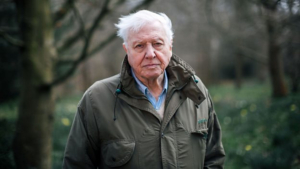Sir David Attenborough Returns to BBC One with EXTINCTION

Presented by Sir David Attenborough, Extinction: The Facts, a 1x60' for BBC One, investigates what the future holds for our planet.
Last year a WWF report, stated that the mammal, bird, fish, reptile and amphibian populations have shrunk by 60 per cent in just over 40 years. According to a recent UN report, nearly a third of corals around the world and more than a third of marine mammals are threatened with extinction. The abundance of native species in most major land habitats has fallen by a fifth, mostly since 1900, and earlier this year, scientists from around the world published their most thorough review of the current state of the natural world to date.
Shockingly, the UN report warned that around a million species of plants and animals face extinction, many within decades if urgent action isn't taken. Extinction is a natural part of life but this time it's different. The rate of change during the past 50 years is unprecedented in human history and could change our planet forever.
Extinction: The Facts looks beyond our emotions to investigate what the extinction crisis means, not just for the planet but for every one of us. World-leading scientists will explore why species are disappearing at such an alarming rate and will ask what that means for humanity: Planet Earth owes its incredible biodiversity to an incredibly complex but delicate eco-system. Everything in nature is connected so the loss of one species can cause entire ecosystems to collapse, eco-systems we depend on for food, water and resources. The blue whale, the biggest mammal on earth, cannot survive without plentiful supplies of krill, one of the smallest animals in the ocean. It's said that food supplies for the human population could be threatened if the decline of pollinating insects continues.
Pollution, deforestation and overfishing are threatening the delicate balance of our world. Sales of reusable coffee cups have reached unprecedented levels. But even if more people than ever are changing their habits for the planet, is it enough?
Alison Kirkham, BBC Controller Factual Commissioning, says: "Even today a record number of wildfires are burning in the Amazon and a million species are threatened with extinction. We know our audience has a hunger to understand how these urgent environmental issues affect them, but more than that, what they themselves can do in their homes. We've proven with Big Blue Live, Climate Change: The Facts, Drowning In Plastic that we can bring big broad audiences to complicated environmental subjects. This is television that matters. And I'm thrilled Sir David Attenborough continues to work with us to make it."
Extinction: The Facts, a 1x60' for BBC One, is made by BBC Studios Science Unit. It was commissioned by Charlotte Moore, BBC Director of Content, and Tom McDonald, Head of Commissioning, Natural History and Specialist Factual.
All BBC programming which explores the environment and the challenges facing our planet will sit under the Our Planet Matters banner. This will be an ongoing commitment rather than a single season, and the content will explore a wide variety of issues to help inform audiences over the years ahead.
Over five million viewers watched the launch episode of BBC One's Blue Planet Live earlier this year, which explored the health of our oceans and marine life in three locations across the globe with Chris Packham, Liz Bonnin and Steve Backshall. Three million people tuned in to watch the first episode of Hugh Fearnley-Whittingstall and Anita Rani's investigation into single-use plastic, in War On Plastic. Also part of Our Planet Matters, BBC One Blue Planet UK celebrated marine life from all corners of the UK; and Gordon Buchanan gave the planet a health check from the air in Equator from the Air.
There will be future programmes exploring subjects including meat production with Liz Bonnin.
Videos


